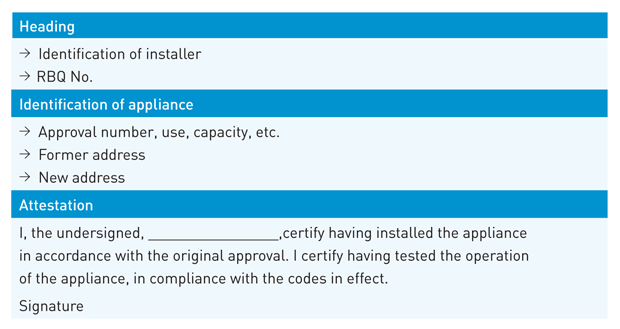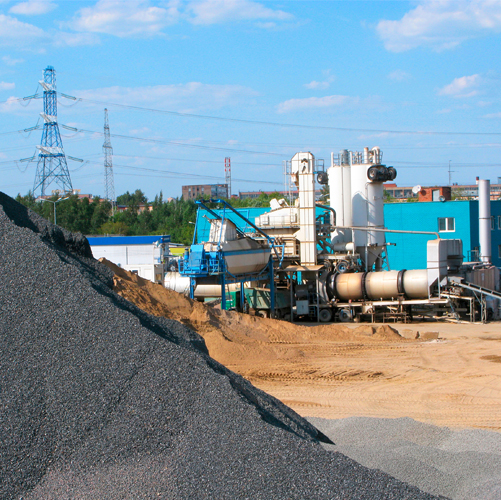A manager may decide to acquire a second-hand appliance or, perhaps, in the case of a relocation or renovation, an appliance originally approved on-site is later installed in a new location. What needs to be done to ensure it is in compliance?
The acquisition and removal of an appliance already approved under the Code for the Field Approval of Fuel-Related Components on Appliances and Equipment (CAN/CSA-B149.3) is not always a simple matter. Certain clauses in the Code cover the integration of the appliance into the immediate environment and the functions for which it was designed.
The good news
The Régie du bâtiment du Québec (RBQ) is the competent authority when it comes to natural gas. It considers that an appliance approved under CSA B149.3 by a certification organization may be relocated without its having to be approved again. An appliance that has been approved must always carry the label from a recognized organization attesting that it complies with the construction and test requirements. The same goes for an appliance approved by the RBQ that carries its seal of approval.
The conditions to be respected
The appliance must be disconnected from the natural gas supply (at the tap on the appliance), from the electricity supply, and from the exhaust system. It must be removed in one single piece or, at most, in major parts such as the natural gas train, the exhaust system, and sections of the appliance. It is unacceptable to dismantle it in small, detached parts, since that would greatly increase the risk of errors. In fact, errors may be made when the appliance is reassembled due to the loss of parts or due to a misinterpretation as to how it works.
After it is dismantled, the contractor must send a declaration of the work to the RBQ. If the appliance has to be modified in order to be installed in its new site, a new approval has to be obtained, in accordance with the edition of Code B149.3in effect.
The role of the energy distribution company
Gaz Métro does not have the mandate, or the authority, to decide if an appliance complies with the Code for the Field Approval of Fuel-Related Components on Appliances and Equipment (CAN/CSA-B149.3). However, Gaz Métro must none the less make sure that it is safe to allow such an appliance to be operated.
According to the Building Act (Art. 38), Gaz Métro, as an energy distribution company, must refuse to supply an installation that is defective or that presents, to the best of its knowledge, the risk of an accident. The validity of an approval is a guarantee of safety.
An on-site approval takes into account several factors in the design of an appliance: type of gas, capacity, sequence of operation, environment, and components. Just one variation may mean that the approval is no longer valid.
The solution: The installer
The expertise of the installer will be the guarantee of the safe design and installation according to the original manufacturing specifications for the appliance in question.
| Article 4.5.6 of the Natural Gas and Propane Installation Code (CAN/CSA B149.1): |
| “A used appliance shall be inspected and determined to be safe for continued use by the installer before reconnection to supply piping or tubing.” |
Gaz Métro requires a letter from the installer confirming that the appliance is still designed, installed and used according to the conditions of its original approval. The installer will so declare after having carried out tests to ensure the safe operation of the appliance (as per Annex A of B149.3).
It should be noted that Gaz Métro does not judge the pertinence of the contractor’s verification report; however, this report must be made available at the request of the competent authority.
Content of a typical attestation letter

Charles Côté, Eng.
Technical Advisor
Continue reading








